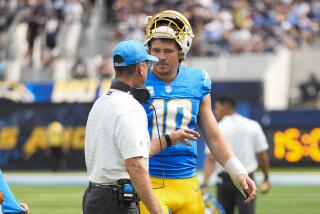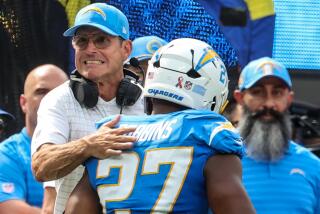Hubbard Described as Paranoid, Angry at His Father
- Share via
Henry Hubbard Jr., sentenced Monday to 56 years in prison, was portrayed in court Monday as a tormented, paranoid overachiever who chose couples as his victims to punish his tyrannical, alcoholic father and who will never have a normal personality.
Even during the highlights of his life--being drafted by the San Diego Padres, his marriage and the birth of his daughter--Hubbard could not shake his feelings of being forsaken, according to testimony. He accused his wife of cheating on him, and when a knee injury forced him out of the minor leagues, he barely reacted.
“The essence of Henry Hubbard’s psychological disorders is that this man, who had everything, who achieved everything a man could want, was really an empty shell,” said Dr. Richard Levak, a clinical psychologist in Del Mar who testified for the defense in court today after examining Hubbard during sessions that lasted a total of about 10 hours.
“On the outside, he had done all these things,” Levak said. “On the inside, he couldn’t enjoy it, couldn’t feel it, couldn’t experience it. He had numbed himself so effectively.”
The numbing came from years of watching his father, Henry Hubbard Sr., drink heavily on weekends and physically abuse his mother, Annie, Levak said. To this day, Hubbard Sr., the director of student services for the Lancaster Area School District in South Carolina and former principal of several elementary schools in the area, is revered in the town of 55,000.
Young Hubbard felt humiliated by his father’s behavior and powerless to do anything about it. Confused and upset, he stopped inviting friends over on weekends, Levak said.
To counteract those feelings, he pursued sports.
As an athlete at Lancaster High School, Hubbard shattered almost all state records in baseball while holding the position of vice president of his class. He joined the French, Latin and debate clubs. He was offered full scholarships to Florida State University, Clemson University and the University of South Carolina, but opted for tiny Wofford College in Spartanburg, S.C.
Hubbard, who is black, felt ostracized at the mostly white college because he was uncomfortable with his race, according to testimony. All of Hubbard’s victims are white, as is his wife.
But, as the years passed, Hubbard was unable to relate to anybody, black or white, the psychologist said. He was always more of an observer in social settings than a participant.
“He had no deep close personal relationships, no best friends,” Levak said. “Everyone liked him, and he was able to fit in. When losses occurred, he didn’t engage a lot because he hadn’t been emotionally there. He hadn’t really lived in his skin.”
Close to forging a friendship with San Diego Police Officer Jerry Hartless, Hubbard faced another personal tragedy when the rookie cop was shot to death in 1988 while chasing a suspected drug dealer.
A pallbearer at Hartless’ funeral, Hubbard never outwardly mourned the loss and barely talked about Hartless.
His decision to become a police officer in 1986 shocked many of Hubbard’s friends, who said they could not imagine him as an aggressor.
“Henry was searching for respectability, for love, for affection, for acceptance,” Levak said. “Being a police officer is part of that. There was also a part of Henry that wanted to please, to be nurturing and caring of others, and I think being a police officer fulfilled some of those needs.”
Despite several commendations, Hubbard became disillusioned with the brutality that was so much a part of police work. He asked for a transfer to an air unit, but, although he had a good record, there were no spots open to him.
From the time he married his wife in 1984, Hubbard harbored suspicions that she didn’t love him, a product of his own insecurity, Levak said. During an engagement party, for example, Hubbard was preoccupied with an old boyfriend Karen had invited.
During the early years of their marriage, Hubbard demanded sex of his wife as proof of her love, proving to his horror that he was similar to his father after all, Levak said.
“He was becoming angry and abusive and possessive and jealous, and that added a powerful amount of stress to a man who already was not functioning well,” Levak said.
Hours before he committed the first of seven rapes last summer, Hubbard had a fierce fight with his wife.
In almost every attack, he sought out couples, tying up the man and raping the woman nearby as an angry reaction against his father, the psychologist said. Yet, Levak said, Hubbard believed that the women actually felt affection for him.
But the rapes were particularly cruel, according to previous court testimony. Before assaulting a 14-year-old on a La Jolla beach, he asked the teen if she was a virgin. She said yes. “We’ll have to change that,” he said before raping her.
During the same incident, while raping the girl’s 13-year-old friend, Hubbard asked her to “get into it a little bit.” He asked a third victim if it “felt good.”
After the rapes, Hubbard experienced terrific guilt, remorse and fear before returning to the beach for what he felt was a “sense of excitement and accomplishment,” Levak said.
In describing Hubbard as a “psychologically disturbed man,” Levak said the rapist’s shift from a law abider to lawbreaker “wasn’t so much a sudden snapping of somebody who was healthy and then suddenly became unhealthy, but more a gradual evolution with the early signs that something was terribly wrong.”
Kerry Steigerwalt, Hubbard’s attorney, asked Levak if Hubbard could ever return to society and live a normal life.
“Henry is never going to be a healthy, normal personality,” Levak said. “The enormity of what he has done to himself and others is too enormous to comprehend and then have a normal life. But he has begun the process of getting in touch with his feelings.”
Someday, after his release from prison by the time he is 58 or 59 years old, Hubbard can contribute to society, Levak said.
“Right now, he is hungry to know how this happened,” Levak said. “He wants to know what makes a rapist and what will happen to the people he attacked. He wants to know, ‘How do I explain this to my wife and daughter?’ He has shown courage in not icing over his feelings.”
More to Read
Go beyond the scoreboard
Get the latest on L.A.'s teams in the daily Sports Report newsletter.
You may occasionally receive promotional content from the Los Angeles Times.










